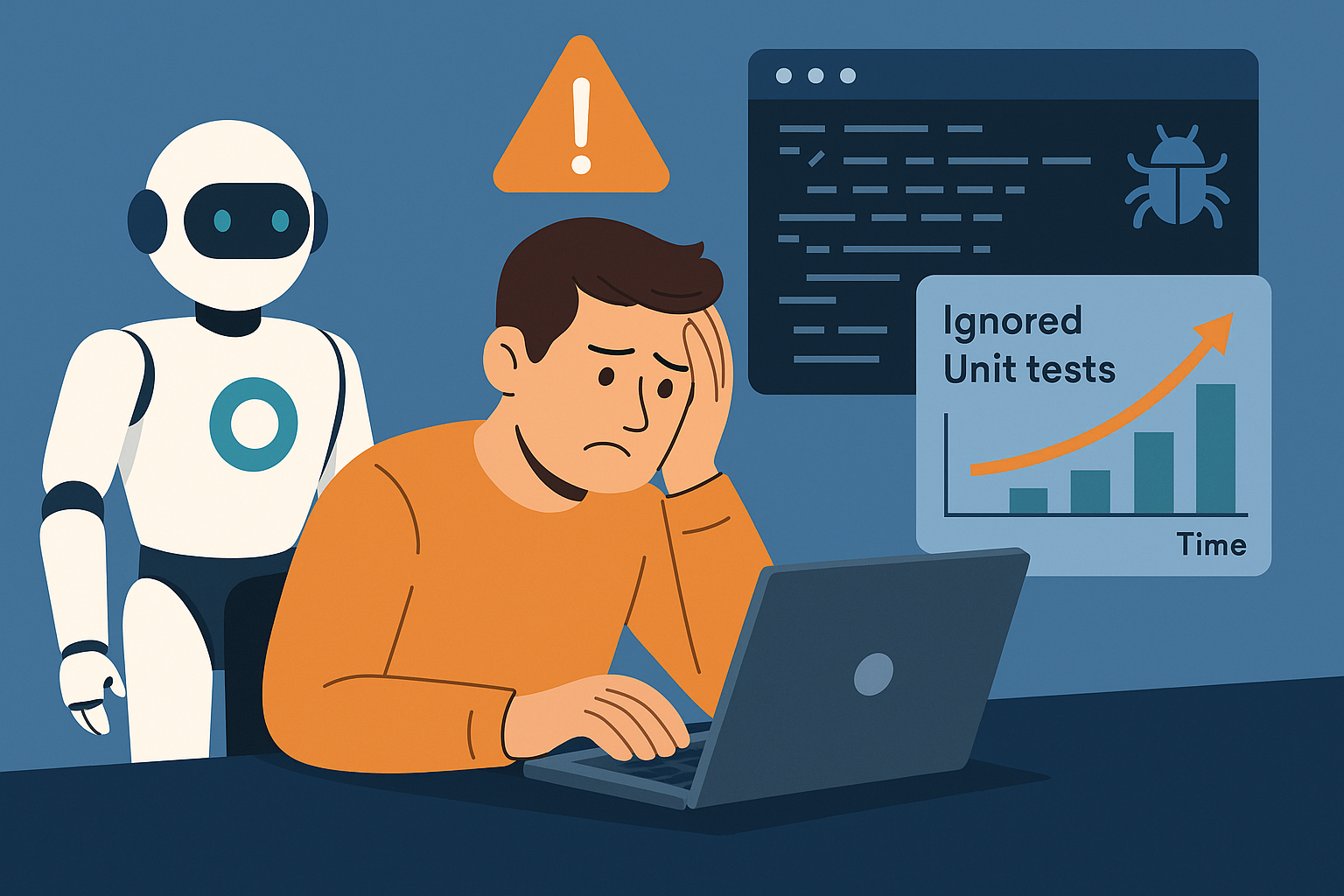Ignored unit tests are one of those quiet killers in software teams.
Unit testing is one of those practices everyone agrees is “important”
Until the sprint gets tight, the specs shift again, and the only thing that seems to matter is delivery speed.
But something bigger is changing.
In 2025, teams aren’t just skipping tests. They’re skipping junior developers entirely, replacing them with AI copilots and hoping that the tests they used to write don’t break. And when those tests are ignored during product churn? Bugs slip through, and quality falls fast.
The Problem: Ignored Unit Tests and What It Costs
When you move fast, unit tests often don’t keep up:
- APIs change, but tests don’t.
- Coverage drops, and no one knows what’s actually being tested.
- Junior devs who maintained tests? Gone.
Even worse, teams stop trusting the tests they do have. So they ignore the failures or comment them out.
The result? A growing pile of broken tests and false confidence.
Why Test Maintenance Feels So Hard
Modern agile teams are in constant motion. Weekly releases. Daily merges. Shifting priorities. In that chaos, test code becomes a burden, not a safeguard.
Especially when:
- The tests are fragile (tied to implementation details).
- The tests are hard to read (you don’t know what it’s really testing).
- The mocking is too complex to update quickly.
So teams give up. They rely on integration tests and manual QA. But those miss the subtle regressions that unit tests were born to catch.
Example: Fragile vs. Resilient Unit Test
❌ Fragile test example:
|
1 2 3 4 5 6 7 8 9 10 |
[Test] public void Should_UpdateOrderTotal_WhenItemAdded() { var order = new Order(); order.InternalPriceList = new List<decimal> { 9.99m }; // Implementation detail order.AddItem("apple", 1); Assert.AreEqual(9.99m, order.Total); } |
- Breaks if internal price list structure changes
- Tied to internal logic rather than observable behavior
✅ Resilient test example:
|
1 2 3 4 5 6 7 8 9 10 11 12 |
[Test] public void Should_UpdateOrderTotal_WhenItemAdded() { var pricingService = Isolate.Fake.Instance<IPricingService>(); Isolate.WhenCalled(() => pricingService.GetPrice("apple")).WillReturn(9.99m); var order = new Order(pricingService); order.AddItem("apple", 1); Assert.AreEqual(9.99m, order.Total); } |
- Uses mocking to simulate external service behavior
- Decoupled from fragile implementation
How to Write Tests That Survive Code Churn
The best tests:
- Rely on public APIs, not internals
- Are mocked around external boundaries, not deep logic
- Focus on what the system does, not how
✔️ Keep Your Tests Focused on Behavior
|
1 2 3 4 5 6 7 8 9 10 11 12 |
[Test] public void Should_ReturnDiscountedPrice_WhenCustomerIsPremium() { var userService = Isolate.Fake.Instance<IUserService>(); Isolate.WhenCalled(() => userService.IsPremium("user1")).WillReturn(true); var priceCalculator = new PriceCalculator(userService); var result = priceCalculator.GetPrice("user1", 100); Assert.AreEqual(90, result); // 10% discount } |
- Mocks external decision logic
- Keeps the test stable, even if internal discount formulas evolve
What Gets Lost When Tests Get Ignored
Tests aren’t just code quality metrics. They’re:
- Living documentation of how your system behaves.
- Fast feedback loops when you refactor.
- Safety nets for onboarding new developers (or AI).
When unit tests rot, you lose that safety and the cost of bugs climbs quickly.
A Smarter Way Forward
You don’t need 100% coverage. You need the right tests.
✅ Test the logic that can’t be easily seen in integration.
✅ Focus on public APIs and stable contracts (like Graph APIs).
✅ Use tools that make mocking simple, not painful.
Typemock helps with that: you can write fewer, more resilient tests by mocking what matters without rewriting your architecture.
If you want to understand the impact of poor test coverage over time, see IBM’s classic study on software defect costs.
Because good tests aren’t about code coverage – they’re about confidence.
Conclusion: Why Ignored Unit Tests Cost You More Than You Think
Junior devs may be disappearing, but code churn isn’t. Your tests have to work smarter, not harder.
Mock better. Test what matters. Stay confident.




